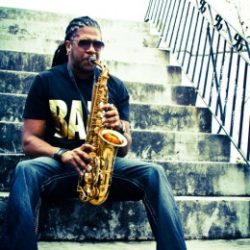NOLA 300 Music
The Next Generation Considers the Next 300 Years
Tulane 2018 graduate Justin Gitelman spoke to members of the New Orleans music scene's next generation. Read what they had to say, and listen to his interview with NOCCA and Berklee grad Khris Royal.
Published: September 4, 2018
Last Updated: March 22, 2023
As part of his coursework through the university’s Center for Gulf South studies, Tulane class of 2018 member Justin Gitelman interviewed three young, up-and-coming acts in the New Orleans music scene: Saxophonist Khris Royal, a NOCCA and Berklee College of Music alum who also plays in George Porter, Jr.’s band; Stoop Kids, a Loyola-formed jazz-funk group; and The Grid, Florida transplants who reimagine hip-hop classics through a jazz and funk lens, as well as crafting originals in that style.
All three of these artists I have identified because they are not only my favorite current artists in the New Orleans scene, but also because they represent the newest wave of evolved sounds that show a clear respect for and overlap with New Orleans cultural music while innovating to fuse new sounds and ideas to create something totally new and almost unrecognizable. This concept is important because for the past 300 years, tradition and heritage have been emphasized, but each era is iconic because of those who push the boundaries (respectfully, of course). Therefore, I wanted to find out what’s going on in the minds of those artists who are on the cutting edge of becoming the next layer in New Orleans history moving past 300 years.Listen below to Justin’s interview with Khris Royal
https://soundcloud.com/alisonfnola/khris-royal-leh-podcast-5-13-version
About New Orleans Music
I asked for these artists’ perspectives on how one makes music ‘sound like New Orleans’ while balancing the opposing motivations of tradition and innovation, as well as what they thought the most important aspects of the music’s cultural impact are that should be preserved, educated, and lived.
Roots, Tradition, and Innovation
Both Khris Royal and Stoop Kids expressed that actively attempting to make their music have the sound of New Orleans is both not of interest to them and also not a goal they believe should be in anyone’s method for being music of New Orleans. While Khris Royal finds playing with George Porter Jr. to satisfy a more traditional side of the coin, the sentiment shared is that the best music is a genuine expression of creativity, and there is never any required definition for what makes New Orleans music New Orleans aside from that it is made here and makes its mark. After all, the music that became iconic of the history and culture of New Orleans was simply music that happened to be made through the influences and life of those who represented New Orleans. Khris Royal also expressed how seriously he respects the tradition, and finds it in poor taste when the traditional music is played incorrectly or mixes two different songs without even realizing that they’re different or what their meaning is.
The Grid‘s AJ Hall had a slightly different perspective. As a transplant, he studied all of the music in 300 years of history to appreciate its roots, learn all of the distinctive rhythms, and respect it. Aside from that respect, he never claims to be defining of New Orleans present or future history, but rather allows his immersive knowledge and studious dedication to understanding the rhythms and jazz music to act as a layer that ground The Grid partially into the influences of the New Orleans music scene. In doing so, he embodies the idea that music that is made here, defines here, without any particular need to create a sense of trying to forcibly fit in.
What is most iconic and important to be preserved
A decisive answer that Stoop Kids and Khris Royal emphasized was that the one thing that connects New Orleans music is that you can dance to it. It is undeniably fun, danceable, groovy, and balances a dynamic of distinctive, upbeat rhythms and an influence of a sunny, happy environment. Khris Royal noted that the rhythms coming from Africa are what makes it so unique and culturally rooted. They expressed the need to maintain this infectious, bouncy energy in music and identified it as a key to recognizing New Orleans music.
AJ Hall believes that the sense of community it draws from and perpetuates should always be remembered and makes it powerful and greater than the sum of its parts. Whether it’s a group following a second line on a sunny, crawfish boil Sunday, a gospel group joining together to knock everyone’s socks off at Jazz Fest with a shockingly energetic wall of sound, or bringing everyone together to celebrate life in the streets during Mardi Gras parades, New Orleans not only has a music scene, but also a music family.
